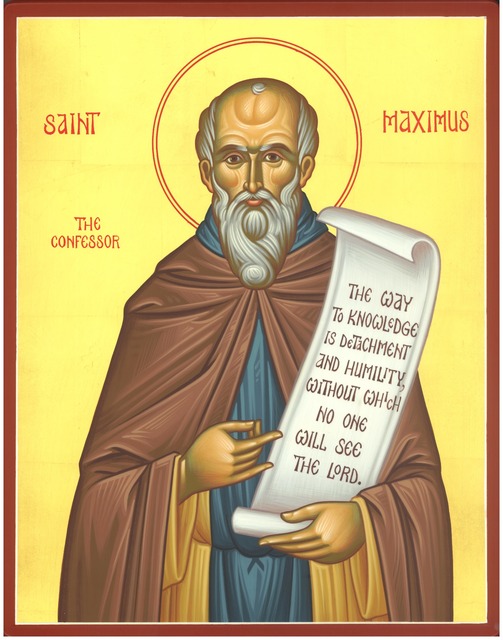
AUGUST 13 is the traditional memorial of ST. MAXIMUS THE CONFESSOR (+662).
Maximus was probably born near Constantinople, being as that area was one of only a handful of places where he could have gotten such an intensive education as he apparently did. It is also assumed that Maximus was from a well-to-do or influential family in order for him to have become head of the Imperial chancery in the Byzantine capital at only 30 years old. He served Emperor Heraclius well.
For whatever reason, Maximus chose a different life after a while and took monastic vows at the abbey of Phillipicus at Chrysopolis, across the Bosporus from Constantinople. He soon became the abbot.
When Persians invaded the Byzantine empire, around 614, Maximus was forced to flee to Carthage, finding a new home in Africa. He was able to study under the learned St. Sophronius of Jerusalem. This bishop was one of the first to defend orthodoxy against Monothelitism, the belief that Christ had only a divine will, not a human will that could make decisions. Maximus readily accepted the Christological principles of his tutor as well as those of St. Gregory Nazianzen. By 640, he, too was defending the orthodox position.
Maximus was an excellent writer and philosopher. He was able to take the writings of these two men, and others, and merge them with the reasoning of Aristotelian logic to explain the orthodox position.
Pyrrhus, sometime Patriarch of Constantinople, was exiled on political grounds. Since the official stance of the Byzantine government was Monothelitism, Pyrrhus believed it. He and Maximus publicly debated the issue around 640 AD and Pyrrhus admitted defeat, denouncing the belief. The two went to Rome in 645 to meet the pope. Then, Emperor Heraclius died and Emperor Constans II was crowned. Pyrrhus returned to Constantinople to rescind his denouncement. Maximus remained in Rome to attend the Lateran Council that Pope Martin had called in 649. Here all the attending bishops condemned Monothelitism. It may have been Maximus who wrote the official acts of the council.
In four years, Constans II, a supporter of Monothelitism, ordered the arrest of Maximus and Pope Martin. The pope, condemned without a trial, died before he could be sent to Constantinople.
Maximus was held somewhere for a while, then sent to the capital in 658. Here he was not only accused of heresy, he was also accused of aiding the Muslims in their attacks on Africa and Egypt. After his trial, he was exiled for four years.
In 662, a second trial was conducted. After this he was tortured, his tongue cut out and his right hand chopped off. He was then transported to a castle in modern-day Georgia. He died, soon after, on August 13, 662, probably due to the amputations. At the third Council of Constantinople in 680-681, Monothelitism was declared a heresy and Pope Martin and Maximus were vindicated.
Maximus left more than a dozen complete works that have been studied throughout the centuries.
“I condemn no one; but I would rather lose my life than depart from the least point of the faith.” St. Maximus

Recent Comments